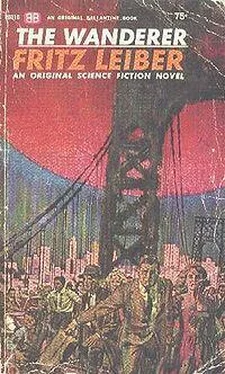He found himself thinking of how safe the Earth had swung in all its loneliness for millions of years, like a house to which no stranger ever comes, and of how precarious its isolation had really always been. People get eccentric and selfish and habit-ridden when they’re left long alone, it occurred to him.
But why, he asked himself angrily, when there finally is a murderous intrusion from the ends of the universe, should it look like nothing but a cheap screaming advertisement on a circular hoarding?
Then a flickering afterthought: D for Dai. He remembered that the tides at Avonmouth have a vertical range of forty feet at full moon, and he wondered fleetingly how his friend was faring.
Dai Davies came to consciousness dreadfully cold and biting wood. He managed to get his elbows on the wood — rocking it as he did, and realizing it was the midthwart of the skiff — and to lift his face up off the wood and prop it on his hands. Over the gunwales he saw only the dark plain of the swollen Bristol Channel with a few tiny distant lights that might be Monmouth or Glamorgan or Somerset, or the lights of boats, except it was hard to tell them from the scattering of the dim stars.
He felt the cold cylinder of a bottle against his chest. He twisted off the cap and got down a mouthful of Scotch. It didn’t warm him at all, but it seemed to sting him a little more alive. The bottle slipped from his hand and gurgled out on the strakes. His mind wasn’t working yet. All that would come into it was the thought that a lot of Wales must be under him, including the Severn Experimental Tidal Power Station. The first part of that thought recalled scraps of Dylan Thomas’ poetry which he mumbled disjointedly: “Only the drowned deep bells of sheep and churches…dark shoals every holy field…Under the stars of Wales, Cry, Multitudes of arks! (Skiff-ark. Noah solo.) Across the water liddled lands…Ahoy, old sea-legged fox…Dai Mouse! (Die!)… the flood flowers now.”
At regular intervals the skiff lurched. Dai laboriously worked his mind around to the thought that the low little waves might be the dying undulations of Atlantic combers rolling up-Bristol against the turned tide. But what was it that was speckling their tiny crests with burgundy and beer, with blood and gold?
Then the lurching swung the skiff around and he saw, risen in the east, the purple bulk of the Wanderer with a golden dragon curling on it. Floating before the dragon was a triangular golden shield. Swinging into view around this foreign globe was a curved, fat white granular spindle, like the gleaming cocoon of some great white moth. Memories filtering up of the crazy Yankee news reports, and perhaps the thought-chain of moth, Luna moth, Luna told him that the spindle was the same moon to whom he and Dick Hillary had bid goodnight fifteen hours ago.
Speechless and still, he soaked in the sight for as long as he could bear. Then as the cold set him shivering convulsively and as the skiff swung away from the sight, moving faster now, and as the lurchings became stronger, he found the nearly empty bottle and took a careful swig from it. Then he wriggled himself up until he was sitting on the mid-thwart, found the two brooms and set them in the oarlocks and began to row.
Sober, or only vigorously drunk after resting, he just might have been able to pull out of his predicament, although the tide had begun to ebb fast and he was nearer Severn Channel than the Somerset shore. But he only rowed enough with his brooms to keep the skiff heading seaward and west, so he could watch the heavenly prodigy. And as he watched, he muttered and crooned: “Mona, dear moon-bach…got yourself a new man, I see…a fierce emperor come to burn the world with water…you’re raped and broken, Mona mine, but more beautiful than ever, spinning a new shape out of your tragedy…is it a white ring you would be?…I’m your poet still, Luna’s poet, lonely…I’m a Loner, a new Loner, Welsh Loner, not Wolf, going to row to America this night just to watch you…while the Lutine bell tolls unceasingly at Lloyds for the ships and cities drowned until the tide stills that, too, and there is only a faint clangor going around the world deep under the seas.…”
The rollers grew higher, foaming golden and wine. A quarter mile beyond the bow, had he ever turned to look ahead, a nasty cross-chop was developing, the net of jewel-flecked waves spurting high at the knots.
Bagong Bung, tiny beside his big Australian engineer, watched the rust-holed, weed-festooned stack rise by visible stages from the sparkling water fifty yards beyond the bow of the “Machan Lumpur” as the Wanderer set over Vietnam and the sun rose over Hainan.
A lively current strained at the lacy stack and foamed through its holes and tugged at the “Machan Lumpur,” too, so that the tiny steamer had to keep her screw turning just to hold her position, as the Gulf of Tonkin went on emptying into the South China Sea.
A low sonorous sound came from the south, like a very distant jet boom. The two men on the “Machan Lumpur” barely noted it. They had no way of knowing it brought news of the explosion of the volcanic islet of Krakatoa in the Sunda Strait, two and a half hours ago.
And now the colorfully-encrusted bridge of the wreck came into sight, and the current began to slacken. As the full length of the sunken ship became apparent, Bagong hung knew to a certainty it was the “Sumatra Queen.”
Then the little Malay dropped to his knees and bowed west to the Wanderer, and coincidentally to Mecca, and said, softly: “ Terima kasi, bogus kuning dan ungu!” Having thanked the yellow and purple miracle-bringer, he rose briskly to his feet and with a playful, lordly wave of his hand cried out gaily: “We will tie up to our treasure ship, oh Cobber-Hume, baik sobat, and board her like kings! At last, my good friend, is the “Machan Lumpur” truly the Tiger of the Mud!”
Sally Harris leaned in the dusk on the balustrade of the penthouse patio and sighed.
To the west the last flames of sunset mingled with those of the oil that had gushed from flood-broken tanks and was now floating and burning on the salt water flooding Jersey City. To the east the Wanderer was rising in its dinosaur face.
“What’s the matter, Sal?” Jake called to her from where he was sipping brandy and chopping away at various cheeses. “Don’t tell me our fire’s started again.”
“Nope, it looks pretty much out. The water’s halfway up and still coming.”
“Is that what’s bothering you?”
“I don’t know, Jake,” she called back listlessly. “I been watching churches going under. I never knew there were so many. Saint Pat’s and Epiphany and Christ and Saint Bartholomew’s and Grace and Actors’ Temple and Saint Mary the Virgin, and Calvary, where they started AA, and All Souls and Saint Mark’s in the Bouwerie and B’nai Jeshurun and The Little Church around the Corner and—”
“Hey, you can’t see all those from there,” Jake protested. “You can’t see half of them.”
“No, but I can see them in my mind.”
“Well, get your mind out of the dumps, then!” he ordered. “Hey look, Sal, our planet’s got King Kong on him and he’s rising over the Empire State Building. How’s that for a crazy gag? Maybe I can work it into the play.”
“I bet you can!” she said, the excitement coming back into her voice. “Hey, have you finished my Noah’s Ark song?”
“Not yet. Jesus, Sal, I got to relax after the fire.”
“You’ve relaxed half a fifth. Get your mind to work.”
Doc shouted: “All out, everybody, for a stretch, and to answer Nature’s calls,” forcing a rudely jolly note into his hoarseness. “Wojtowicz, it looks like we’ve finally found the roadblock you deduced.”
Читать дальше










